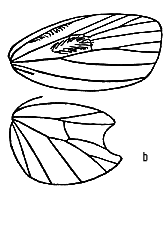
|
|
Garudinia Moore Type species: latana Walker, Sri Lanka (Fig 149).
This genus shares with the next a forewing facies consisting of two dark brown bars on a white ground and, in the male, a deep, marginally excavate hindwing. In Garudinia the brown bands are broader with the more basal one often not reaching the costa. The hindwing is often shaded grey. Both genera have androconial patches in the male, but these are restricted to the hindwing costa in Padenia Moore. In Garudinia they occur in the forewing cell (Fig 6b) and, in the simulana Walker group, in that of the hindwing and near its apex also (Fig 6c). The forewing also has a fold near the costa. In Padenia there are at least three medial sector veins involved in the branching system of the forewing, but two at most in Garudinia. The cell is short in the type species and its Bornean relative, but long in simulana Walker and allies.
The
male genitalia have the saccular process apically narrowed, often curved. The
female has a zone of slender spines basally in the bursa. |
Copyright � Southdene Sdn. Bhd. All rights reserved.


